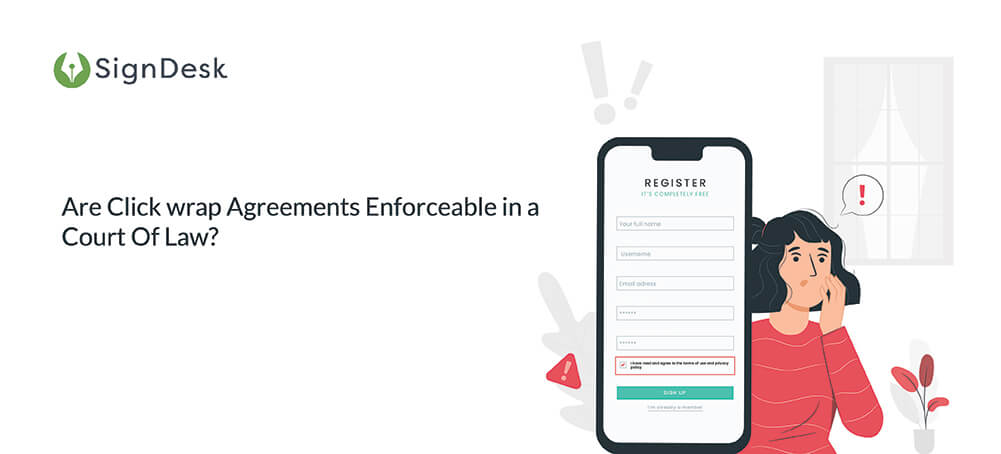Clickwrap Agreement
“Clickwrap agreement” sounds like one of those obscure legal terms that you’ll never come across in real-life unless you’ve done something wrong, but chances are you’ve agreed to several clickwrap agreements in just the last week!
What are the clickwrap agreements?
Clickwrap agreements are those innocent and ubiquitous little pieces of text like – “I have read and agree to the terms of service” or “I agree to the Terms and Conditions,” often with a check-box next to them.
They’re called clickwrap agreements because they require users to perform an action, usually, a click, to indicate that the user accepts the agreement.
Here’s an example –

Sure, but so what?
You’re likely thinking, “Who reads these anyway?” and you’re right. A survey by Deloitte found that over 90% of consumers accept clickwrap agreements without reading the underlying terms and conditions.
In a situation with this much oversight, things are bound to go wrong once in a while.
Take a look at the infamous case of Specht v Netscape Comms. Corp, in which the users’ personal information was siphoned off by Netscape after the users unwittingly agreed to terms and conditions containing an arbitration clause.
It’s always good to know exactly what you’re agreeing to. But not all of us have the time or will power to go through the legalese in a clickwrap agreement.
So suppose you’ve accepted one without reading what it entails, should you be worried? More importantly, will the agreement hold up in court?
Can a case be made for clickwrap agreements?
The short answer is both yes and no.
For an agreement to be enforceable in court, it must be turned into a contract. This is where the law comes in.
Section 10 of the Indian Contract Act talks about when an agreement turns into a contract – “All agreements are contracts if they are made by the free consent of parties competent to contract, for a lawful consideration and with a lawful object, and are not hereby expressly declared to be void.”
Clickwrap agreements are electronic in nature. However, they appear to check all the boxes (pardon the pun) that the Indian Contract Act requires.
Additionally, Section 10A of the IT Act (2000) states – “Where in a contract formation, the communication of proposals, the acceptance of proposals, the revocation of proposals and acceptances, as the case may be, are expressed in electronic form or by means of an electronic record, such contract shall not be deemed to be unenforceable solely on the ground that such electronic form or means was used for that purpose.”
For us, this essentially means that clickwrap agreements will not be unenforceable simply because they happen to be digital. In other words, this is saying that clickwrap agreements are e-contracts and hence will be enforceable in a court of law. This is only if all the conditions of a valid contract are fulfilled.
Therefore, it looks like clickwrap agreements are indeed enforceable. This means there’s no hope for people who scroll through really fast.
But there’s more. Let’s delve into the details of what the conditions are for a contract to be valid.
For a contract to be relevant in court, the following conditions must have prevailed when the agreement was accepted –
- Free Consent
- Offer
- Capacity
- The legality of Subject Matter
In most cases, it’s difficult to prove that the person agreeing to the contract possessed the capacity to do so. It’s equally difficult to show that they agreed of their own free will.
Additionally, in clickwrap agreements, one party (the party whose terms and conditions you’re agreeing to) usually has more bargaining power than the other (You). This is because you have to accept their clickwrap agreement to use their services. Such imbalances in power sometimes tend to tilt the scales of justice in favor of the more vulnerable party.
However, since there isn’t a clear amendment to the Indian Contract Act with regards to clickwrap agreements, rulings can go both ways.
Here are a couple of cases for some context.
- In Trimex International FZE vs. Vedanta Aluminium Limited, India 2010, the Supreme Court upheld the validity of an unregistered and unsigned contract discussed via email, thus confirming the enforceability of the contract.
- In the case of LIC India vs. Consumer Education and Research Centre, the Supreme Court of India struck down the contract in question since both parties did not have equal bargaining power. (This sort of contract, in which one party has more bargaining power than the other, is called an adhesion contract)
In Conclusion
Summing up, there are no hard-and-fast laws and amendments to enforce clickwrap agreements.
Therefore, courts deal with clickwrap agreements on a case-by-case basis. They examine the terms and conditions of the contract and the contracting parties.
While there’s some debate about whether e-contracts are enforceable, there’s absolutely no debate about their benefits. Digital contracts enable businesses to massively reduce documentation, document execution costs, and turnaround time, while optimizing efficiency.
Electronic signatures in particular, are representative of the benefits of digital contracts. eSign is a legally valid, secure, and quick way to execute contracts. eSign also ensures zero paperwork and no in-person interactions.
SignDesk’s eSign product, ink.it, has provided several major Indian banks with Aadhaar eSign and digital signature solutions, along with contract templates and an eSign workflow to expedite remote document execution and several other equally important processes.
Are you curious about how digital contracts work and what SignDesk’s contracting products can do for you?
Book a demo with us now, and we’ll show you!